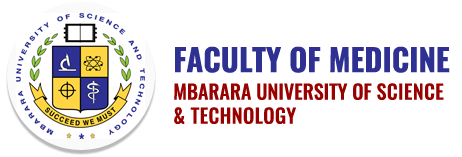Microbiology Department
Mbarara University of Science and Technology started in October 1989 with one Faculty (Faculty of Medicine) only offering a degree of Bachelor of Medicine and Bachelor of Surgery (MBChB).
The department of Microbiology started at the same time, under the headship of an expatriate (Cuban) member of staff, Professor Mercedes Cannizarez. The department had a humble beginning with only two members of staff; Professor Mercedes Canizarez (Head) and Dr. Jesca Nakavuma from the Department of Veterinary Medicine Makerere University as a part time Lecturer. Microbiology is taught in the second year of the program.
The pioneer Microbiology students (23 in number) were therefore in the academic year 1990/1991. In September 1991, Nkangi-Lwanga, a senior Laboratory Technician and later in the same year, James Mwesigye, a Laboratory Technician joined the department. The latter two helped to start a Microbiology/Parasitology Laboratory. The first Microbiology/Parasitology practical classes were offered in the academic year 1991/1992 and combined both the 2nd and 3rd year classes. In 1992, the department embarked on a postgraduate program and enrolled two students for a Master’s degree in Microbiology, under the staff development program. In July 1992, Mbarara University took over the management of Mbarara Hospital. The department started offering diagnostic services especially Microbiological Culture and Sensitivity test that were last done at the hospital in 1978. Since then, the department has grown in student numbers, members of staff, laboratory equipment as well as in the range of services it offers to the University and the community.
The department currently offers training at undergraduate level, Masters’ degree and Doctor of Philosophy (PhD) levels.
Entrance requirements for MSc Medical Microbiology
A degree of BNSc, MBChB; BMLS and be registered/registrable with Allied Health Professional Council or Uganda Medical and Dental Practitioners Council.
Entrance requirements for MSc Microbiology
Degree of Bachelor of Biomedical Science; Bachelor of Veterinary Medicine.
The department offers PhD programs in collaboration with other national/international institutions.
Departmental activities
Teaching
Research
Diagnostic services especially in Mycobacteriology, urinalysis, CSF analysis, blood culture, culture and sensitivity test, Mycology, parasitological tests, various serological tests.
Community service
Surveillance of outbreaks of potentially infectious diseases eg Cholera, Anthrax, Dysentry, meningitis etc.
